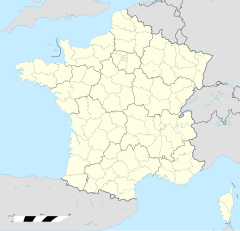Château de Carrouges
| Château de Carrouges | |
|---|---|

Château de Carrouges
|
|
|
Location within France
|
|
| General information | |
| Type | Château |
| Architectural style | French Renaissance |
| Location | Carrouges, Orne, Normandy |
| Coordinates | 48°33′36″N 0°09′16″W / 48.5601°N 0.1544°W |
| Construction started | 14th century |
| Completed | 18th century |
| Owner | Centre des monuments nationaux |
The Château de Carrouges is a château, dating partly from the 14th century, located in the commune of Carrouges, in the Orne department, Normandy, northern France. It is unusual in its combination of an austere fortress with a comfortable residence. The original fortifications at Carrouges were besieged and destroyed by English forces during the Hundred Years War. After the war, the château was rebuilt by Jean Blosset, grand seneschal of Normandy, in the 15th century.
In the 16th century, the family of Le Veneur de Tillières came into possession of the château. It was extended several times until the 17th century, with notable additions including a gatehouse, the western bastion, and the grand apartments. The interior was remodelled in the 18th century, when the music room was built. The last Le Veneur sold the château to the French state, and from 1944 it was restored. It is now managed by the Centre des monuments nationaux and is open to the public.
Originally an oppidum, or defensive hill town, located at the southernmost border of the Norman duchy of William the Conqueror, Carrouges was vainly besieged by the Plantagenets in 1136. It was destroyed by the English in 1367, at the beginning of the Hundred Years War. Jean de Carrouges a vassal of Pierre II, Count of Alençon, became famous as one of the combatants in the last judicial duel to be permitted in France, in 1386. Following his victory, he was appointed a knight of honor to Charles VI.
...
Wikipedia

